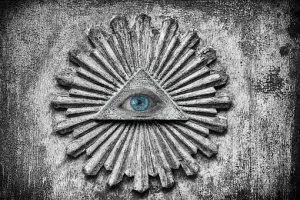All you need to know about ILLUMINATI
Illuminati literally means people claiming to possess special enlightenment or knowledge of something.
What actually is the Illuminati?
It is a powerful and savagely guarded organisation that secretly controls the entire modern world, probably while wearing cloaks. It has done this mainly through infiltrating the media and brainwashing everybody. It could be doing it right now.

There was an actual, historical group called the Bavarian Illuminati that was founded in Germany in the 18th century. It didn’t last long, but it lasted long enough to be the source of numerous conspiracy theories, even to this day. So let’s take a trip back through time
The name “Illuminati” simply means “enlightened” in Latin. With such a bold meaning and the fact it’s in a highly revered language, you can see how it appeals to several different groups, both real and fictitious.
In historical terms, the name usually refers to the Bavarian Illuminati. Founded on May 1, 1776, they were an Enlightenment-era secret society.
The goals of the Bavarian Illuminati were actually quite noble. They wanted to oppose superstition and state abuses of power.
Maybe the most dangerous thing about the “Illuminati” isn’t that such a master cabal has ever existed, but that some people believe it should and wreak havoc under the delusion they run the world.
They were founded by Adam Weishaupt, a professor at the University of Ingolstadt. The Jesuit-run University opposed anything overly liberal or Protestant, so Weishaupt decided to start an underground society of individuals dedicated to propagating the ideals of the Enlightenment.
Adam founded his society based on the Masonic structure. Why didn’t he just become a Free Mason instead of starting his own society? He thought that Freemasonry was too expensive.
The original name was Bund der Perfektibilisten (Covenant of Perfectibility), also known as the Perfectibility. The name was later changed because it sounded too strange.
Along with four other students at the university, the group took the Owl of Minerva as their symbol (not the All-Seeing Eye). It was said to represent wisdom and the ability to see in the dark.
They also gave each other aliases. Adam’s alias was “Brother Spartacus.
Over the next 10 years of its short existence, the Bavarian Illuminati would count roughly 2,000 individuals among its members.
Favourable candidates were Christians of good character. Jews and pagans were specifically excluded along with monks, women, and members of other secret societies.
Candidates were also typically rich, docile, willing to learn, and between the ages of 18-30.

Weishaupt initially had trouble preventing his members from joining the Freemasons, so he ended up joining the Freemasons himself. While he still thought Freemasonry was costly, he joined in order to learn how to better structure the higher levels of the Illuminati. (These upper levels still didn’t exist.)
Speaking of higher levels within the society, let’s talk about a man named Adolph Knigge. Knigge became intrigued with Weishaupt’s Freemasonry/Illuminati blend. He was drawn to the order’s goals of education and prevention of despotism. He consumed the initial material rapidly and with zest, especially because it was quite liberal for Catholic Bavaria. Of course, this knowledge was rather common in the Protestant German states.
When the Illuminati thought of their name, they were hiding in a darkened room with one candle.
They are still hiding in that room with the same candle.
As a clarification, members like Adolph Knigge progressed through “grades” (as in Freemasonry). At each grade, they would learn more material. Because Adolph Knigge progressed so quickly, Weishaupt was forced to admit that he hadn’t come up with material for the highest grades yet. Eventually, both men decided to collaborate in order to make the Illuminati attractive to prospective members in the Protestant German states.
After some time, Weishaupt’s idea of creating an “Illuminated Masonry” began to fail. Knigge identified several reasons. One of the big ones was Weishaupt’s persistent anti-religious sentiment. While Knigge could understand its source as he lived under Catholicism’s stifling grip in Bavaria as well, he knew it would prevent the growth of the order in Protestant lands.
After some ups and downs and failed attempts at recruiting from Freemasonry, the succession of Charles Theodore to the throne in Bavaria boosted the new Illuminati. Why? Although he initially liberalized laws and attitudes, he eventually reversed course. After clamping down on liberal thought, this led to a backlash among educated classes. In turn, this created an excellent recruiting ground for the Illuminati.
Apart from Bavaria, reactions to Catholicism led to membership gains in Austria, Warsaw, Milan, and Switzerland.
Although the order was relatively successful at recruiting high profile members, there were also some notable failures. The Swiss poet and theologian Johann Kaspar Lavater rebuffed Knigge. He didn’t believe that the group’s humanitarian and rationalist aims were achievable by secret means. He also believed that a society’s drive for members would eventually submerge its founding ideals.
The devil doesn’t come to you with a red face and horns, he comes to you disguised as everything you’ve ever wanted.
In the early 1780s, only several years after their founding, the Illuminati came into conflict with the Rosicrucian’s. These were another flavour of Freemasons. Although they were Protestant, they favoured a monarchy over the rationalist technocracy that the Illuminati were in favour of.
Weishaupt and Knigge also had a falling out. Knigge’s toleration of mysticism within the order came up against Weishaupt’s anti-clericalism. Knigge eventually left the order.
In spite of their small number, people began to find out about the Illuminati and their opposition to the monarchy. Combined with the fact that many members had high ranking positions in society, this led to tension and distrust between the Illuminati, the government, and the church.

Some rather ambitious members also made it quite obvious that they favoured their own candidates for important positions. This led to even more opposition and tension.
Alarmed by the potential for instability, the Duke of Bavaria banned all secret societies in 1784 and started the hunt to root out Illuminati members. This forced Weishaupt to flee Bavaria.
At the turn of the 19th century, there were several books and theories published claiming that the Illuminati had survived and that they were behind the French Revolution. This conspiracy theory most likely took hold because the ideals of the French Revolution were similar to those of the Illuminati.
When you reach illumination, you lose paradise. Illumination is the place where you gain knowledge that there is none but you to take care of yourself, you discover that you are the god you had all along sought and that you have no redeemer but you”
Today, there are several fraternal organizations that claim to be descended from the original Bavarian Illuminati…though there is no verifiable evidence of the claims. There have also been many more conspiracy theories (besides the French Revolution) related to the alleged surviving Illuminati, including JFK’s assassination. Once again, however, there isn’t any verifiable evidence to support these claims.




